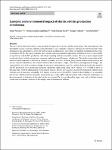Item Infomation
Full metadata record
| DC Field | Value | Language |
|---|---|---|
| dc.contributor.author | Pirmana, Viktor | - |
| dc.contributor.author | Alisjahbana, Armida Salsiah | - |
| dc.contributor.author | Yusuf, Arief Anshory | - |
| dc.date.accessioned | 2023-08-07T04:37:30Z | - |
| dc.date.available | 2023-08-07T04:37:30Z | - |
| dc.date.issued | 2023 | - |
| dc.identifier.uri | https://link.springer.com/article/10.1007/s10098-023-02475-6 | - |
| dc.identifier.uri | https://dlib.phenikaa-uni.edu.vn/handle/PNK/8713 | - |
| dc.description | CC-BY | vi |
| dc.description.abstract | The use of fossil fuel-based vehicles may gradually be replaced by electric vehicles in the future. The trend indicates that the number of users of electric vehicles, especially electric cars, continues to increase. Indonesia is well-positioned to take advantage of this opportunity as it has the world’s largest nickel reserves, an essential raw material for making electric vehicle batteries (EVB). The study examines the economic and environmental implications if Indonesia were to successfully set up electric vehicle (EV) production rather than exporting such raw materials overseas. | vi |
| dc.language.iso | en | vi |
| dc.publisher | Springer | vi |
| dc.subject | electric vehicle batteries | vi |
| dc.subject | electric vehicle | vi |
| dc.title | Economic and environmental impact of electric vehicles production in Indonesia | vi |
| dc.type | Book | vi |
| Appears in Collections | ||
| OER - Khoa học môi trường | ||
Files in This Item:

